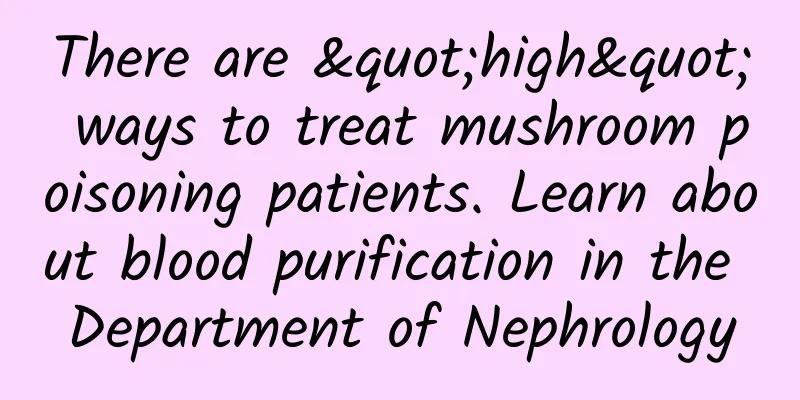There are "high" ways to treat mushroom poisoning patients. Learn about blood purification in the Department of Nephrology

|
Mushrooms, also known as mushrooms, are loved for their delicious taste. However, a considerable number of wild mushrooms are poisonous, which can cause poisoning reactions and even life-threatening if eaten by mistake. In July, many parts of my country entered the hot and rainy season, and it was the season when wild mushrooms grew vigorously. Residents in some areas like to pick and eat wild mushrooms. Therefore, we must be alert to the risks that come with it - the high incidence of poisoning from poisonous mushrooms. Symptoms of mushroom poisoning The symptoms of mushroom poisoning vary depending on the type of poisoning, the amount ingested, and individual differences. The following are some common symptoms of mushroom poisoning: (1) Digestive system symptoms: nausea, vomiting, abdominal pain, diarrhea, loss of appetite, etc. These symptoms usually appear within a few hours after poisoning. (2) Nervous system symptoms: headache, dizziness, changes in mental state (such as confusion, hallucinations, drowsiness or excitement), sensory abnormalities (such as visual changes, tactile abnormalities), ataxia, muscle weakness, etc. These symptoms may appear within a few hours to a few days after poisoning. (3) Liver and kidney damage: jaundice (yellowing of the skin and eyes), changes in urine color (becoming dark or brown), abnormal liver function, abnormal kidney function, etc. These symptoms usually appear in the later stages after poisoning. (4) Cardiovascular system symptoms: increased or decreased blood pressure, arrhythmia, etc. (5) Respiratory system symptoms: difficulty breathing, shortness of breath, etc. Which patients with mushroom poisoning require blood purification treatment? Recently, many hospitals have admitted patients poisoned by accidentally ingesting wild mushrooms. All of them showed varying degrees of poisoning symptoms such as nausea, vomiting, poor appetite, limb weakness, anuria, etc. Many of these patients were admitted to the hospital for tests on blood creatinine, urea, and transaminase, all of which were elevated. They were referred to the Department of Nephrology for blood purification treatment. When a patient is treated for mushroom poisoning, the emergency physician will generally conduct an initial assessment of the patient's poisoning condition to understand the severity of the poisoning. Depending on the severity of the patient's poisoning symptoms, a series of supportive treatments are performed, such as intravenous fluid replacement, anti-nausea drugs, analgesics, etc., to relieve symptoms and maintain fluid balance. In severe cases of poisoning, such as fatal mushroom poisoning, the patient needs to be referred to the Department of Nephrology for blood purification treatment. The following are situations where blood purification treatment may be required: (1) Renal impairment: Renal impairment caused by poisoning, such as significant increases in blood creatinine and urea nitrogen, may require continuous renal replacement therapy to support and promote the recovery of kidney function. (2) Severe poisoning symptoms: Impairment of consciousness, epilepsy, coma, etc., require blood purification treatment to quickly remove toxic substances from the patient's body and reduce the damage caused by poisoning. (3) High toxin concentration in the body: If laboratory tests show that the toxin concentration in the patient's body is high, blood purification treatment is required. Blood purification treatment for patients with fatal mushroom poisoning There is no specific antidote for fatal mushroom poisoning. Patients diagnosed with fatal mushroom poisoning need to be immediately transferred to the emergency intensive care unit for life monitoring and bundled treatment. Bundled treatment includes: blood purification therapy, drug application, whole body and organ function support therapy, and liver transplantation for those who have the conditions. Blood purification therapy can remove toxic substances from the body of patients with mushroom poisoning and also play a role in supporting organ function. It has been widely used in the treatment of mushroom poisoning. Commonly used blood purification treatment techniques mainly include traditional blood purification techniques (plasma exchange, hemoperfusion, hemodialysis) and artificial liver technology (molecular adsorption circulation system MARS, Prometheus artificial liver). Although there is currently a lack of prospective randomized controlled clinical studies on blood purification therapy for mushroom poisoning, some clinical observations have shown that blood purification therapy can improve the survival rate of patients with mushroom poisoning. The "Chinese Expert Consensus on the Diagnosis and Treatment of Mushroom Poisoning" recommends that patients with fatal mushroom poisoning should undergo blood purification therapy as soon as possible, preferably plasma exchange therapy, and hemoperfusion therapy can be selected for those who are not qualified; for patients with liver and kidney damage or multiple organ dysfunction, it is recommended to use multiple blood purification methods as soon as possible to implement individualized treatment [1]. summary Different types of poisonous mushrooms contain different toxins and their mechanisms of action, so the symptoms of poisoning are also different. Some mushroom poisoning may cause serious organ damage and even endanger the patient's life. Clinicians must quickly develop the most suitable treatment plan for the patient based on the patient's specific situation and condition. For patients with more serious poisoning symptoms, different blood purification methods should be selected as soon as possible according to their condition to reduce the patient's mortality rate and improve the patient's prognosis. References: [1] Expert consensus on the diagnosis and treatment of mushroom poisoning in China [J]. Chinese Journal of Emergency Medicine, Vol. 39, No. 8, 2019, pp. 717-725, ISTIC PKU CSCD CA, 2019. |
<<: How to fundamentally treat chronic kidney disease-related pruritus?
>>: Topical treatment of chronic kidney disease-related pruritus
Recommend
What to eat for anemia after induced abortion
After giving birth, the body is relatively weak, ...
What is the cause of genital redness and swelling?
Vulvar itching and redness and swelling are sympt...
Baby has diarrhea?! It may be related to antibiotics
I believe everyone is familiar with antibiotics, ...
How long does it take to induce abortion?
Induced abortion is a method of terminating pregn...
If I don't vomit during early pregnancy, is it a boy?
After a woman becomes pregnant, her physical cond...
Why is there heavy bleeding after sex?
A good sex life can increase the affection betwee...
Will having nephritis affect my ability to get pregnant?
The kidneys are very important organs in the body...
Reasons for weight loss during pregnancy
In daily life, as people are pregnant, there are ...
Do I need to take calcium tablets when I am seven months pregnant?
Calcium supplementation is also needed after seve...
Breasts of fifty-year-old women
As people's living standards improve, the rat...
How to keep in shape during confinement
In life, you will find that many female friends w...
What causes sagging breasts in women?
In life, many women find that their breasts are s...
What are the fetal movements at six months of pregnancy?
For pregnant mothers, the fetus in the belly grow...
Does a pregnant woman have a higher temperature than normal people?
Pregnant women may experience some uncomfortable ...
What is the difference between a warm baby patch and a menstrual patch?
In life, many people do not know what the differe...









